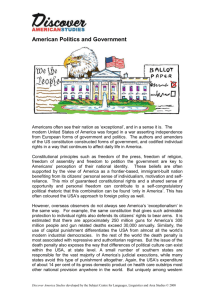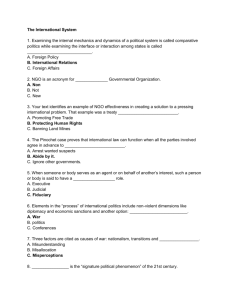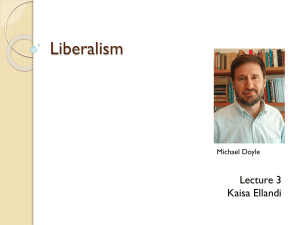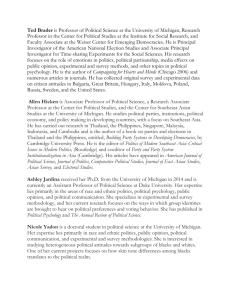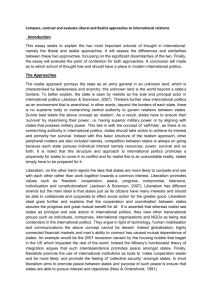Political Science Final Exam 2013
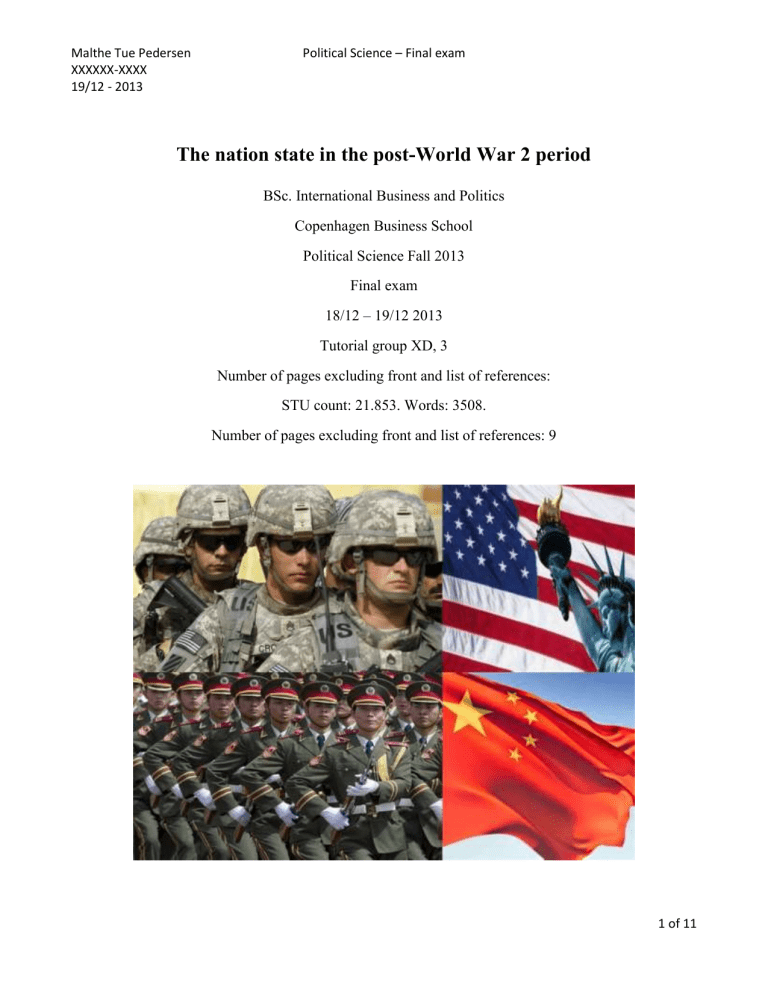
Malthe Tue Pedersen
XXXXXX-XXXX
19/12 - 2013
Political Science – Final exam
The nation state in the post-World War 2 period
BSc. International Business and Politics
Copenhagen Business School
Political Science Fall 2013
Final exam
18/12 – 19/12 2013
Tutorial group XD, 3
Number of pages excluding front and list of references:
STU count: 21.853. Words: 3508.
Number of pages excluding front and list of references: 9
1 of 11
Malthe Tue Pedersen
XXXXXX-XXXX
19/12 - 2013
Political Science – Final exam
Introduction
After the end of the Second World War, we have seen unprecedented trade and cooperation through international organizations and a great rise in the number of democracies worldwide. The European
Union has pooled sovereignty from its member states, and the UN is now the main involved in all major conflicts and disputes around the world. Some argue that economic ties and interdependence between nations have replaced military power. Will this lead to the end of the “nation state” as a central concept in politics? Or is the world still an anarchy between states, in which the only civilized life can be within the framework of the state? That is what this essay tries to examine, by discussing the historical changes from the viewpoint of the two major schools of thoughts in International Relations: realism and liberalism. The next paragraph will present the structure of the assignment.
Introduction to the structure
I will argue that nation states is still the central concept in politics and it is the framework, which most other subjects in politics evolve around. However, the role of nation states has declined and will continue to do so, if the historical changes that we have seen in the post-war period, continuous to affect international relations and politics. First, I will define the nation state and present the approaches, which I will use to analyze the historical changes after WW2. Then I will present the three major historical changes, based on empirical data, which will be the subjects of discussion. These subjects are institutional, economic and political changes on a global scale. Then I will present the two major schools of thoughts, which include realism, which will be based on Thomas Hobbes and Kenneth
Waltz´s thoughts, and liberalism, which will focus on three distinctive kinds: institutional, independence and republican liberalism. Then I will turn to the discussion of the historical changes, from the viewpoints of a realist and a liberalist. Finally, I will present the main findings of the essay and then conclude. The next two paragraphs will define the nation state and what is meant by a “central concept”.
Definition of the Nation State
There are many different ways of defining a state. Joseph Stalin defined the nation state in 1913 as follows: “… an historically formed, stable community of people, united by community of language, of ter-
2 of 11
Malthe Tue Pedersen
XXXXXX-XXXX
19/12 - 2013
Political Science – Final exam ritory, of economic life, and psychological make-up, which expresses itself in community of culture
”(Stalin 1913). Therefore, Staling views the language, economy, history, territory and the people as central elements in a state. These factors are objective terms, used to describe a nation, but one must also take into account the subjective view of the members of the nation, and then “ In this final instance, the nation is a psycho-political construct
” (Heywood p. 109). In this definition, a nation is a political community. Other groups, ethnic, religious etc. are therefore not nations, since they have no ambitions of forming a political community and achieve political autonomy. Eric Hobsbawn has examined this phenomenon in his book “
The invention of tradition
” from 1983, and argues as the title expresses, that nationalism has created nations, and not the other way around. In this assignment, nation states will be referred to as political communities, and countries with several languages, Belgium and Switzerland, and with several ethnicities, USA, are in this definition also nations, since they have shared citizenships and political aspirations.
Definition of a “central concept”
When discussing whether the nation state is still a central concept in politics, I will refer to a central concept, as being the main model of analyzing, assessing and discussing political science. And the term will be used to describe the notion, which most or all other themes are related to. Moreover, a central concept influences other concepts in Political Science. In this context, relating to the nation state, it will be evaluated whether it still makes the most important decisions and whether it is responsible for the major changes in International Relations and domestic politics. Now I will briefly go through the approaches that will be used in the analysis and the discussion, in the next paragraph.
Approaches
I will mainly approach the discussion of this assignment using a behaviouralist approach, which focuses on empirical data, and focuses less on normative and moral questions. For this reason, the verifiable theories in International Relations will be of main interest, which is neo realism and neo liberalism.
Nevertheless, I will introduce the reader to the traditional thoughts of the theories, which has laid the foundation for later developments. Since the behaviouralist approach will be used, institutions and economy will be the central subjects. However, the cultural approach will shortly be touched upon in
3 of 11
Malthe Tue Pedersen
XXXXXX-XXXX
19/12 - 2013
Political Science – Final exam the theory of neo liberalism, and the actor-based approach will not focus on individuals but rather nation states. I will now turn to the institutional changes in the post-war period.
Institutional changes in the post-World War 2 period
The major change after the Second World War has to do with the increased cooperation between states, and the very first steps towards what is being referred to as “global governance”. We have moved towards a “ collection of governance-related activities, rules and mechanisms, formal and informal, existing at a variety of levels in the world of today
” (Karns and Mingst, 2009). After the War, we have seen the emergence of the Bretton Woods system, the United Nations and the EU. In 1914, 49 international organizations existed. By the year 1949, that number has increased to 123. Moreover, in the mid
1980´s, there were 387 international organizations. Furthermore, the average level of memberships has increased from 18, 6 in 1945 to 40 in the 80´s. (Heywood, p. 433). After the end of the cold war and the disintegration of the Soviet Union, the number of organizations fell, however, the trend of growing cooperation between states is clear. Closely linked to institutional changes, are the economic changes, which I will now analyze in the next paragraph.
Economic changes in the post-World War period
One of the most important factors after World War 2 is the increasing trade between countries, which is closely related to the theory of interdependence liberalism, which will be discussed later, hence this the focus of this paragraph. According to the world bank, global exports accounted for 8,1% of the world’s
GDP in 1950, and that number rose to 27,9 % in 2010 (Sørensen, Jackson 2013 p. 119). Trans National
Cooperation’s, TNC´s, now account for 50 % of the world’s manufacturing output and 70 % of the world trade (Heywood, p. 432). One of the biggest spokespersons of the neoliberal economic policy,
Milton Friedman has put it this way “ It is now possible to produce a product anywhere, using resources form anywhere, by a company located anywhere, to be sold anywhere
” (Sørensen, Jackson
2013, p. 197). The point of Friedman is, that governments and nations around the world, does not hold the monopoly to produce and control the production anymore. Different states are merely facilities to produce products, and this production can be moved anywhere and sold anywhere, and it is up to the
4 of 11
Malthe Tue Pedersen
XXXXXX-XXXX
19/12 - 2013
Political Science – Final exam
TNC´s to decide where to produce and sell. Now I will turn to the political changes in the post-war period.
Political changes since the end of World War 2
This graph to the right from
Freedomhouse (see references), shows the number of democracies in the world (blue) from
1973 to 2010, partly free (green) and not free (yellow). The very clear trend is that there has been a rise in the number of democracies worldwide, from around
28% to more than 50 %. This development is closely linked to the republican liberalism, which states, that democracies doesn´t go to war with each other. They might go to war with other countries, but there will be a zone of peace between democracies. To discuss the above-mentioned developments, I will now present the two schools of thoughts: realism and liberalism.
Realism and neo realism – Hobbes and Waltz
In 1946, Thomas Hobbes wrote about what he called “the state of nature” in his book Leviathan, which he describes as
”… no arts, no letters, no society, and which is worst of all, continual fear, and danger of violent death, and the life of man, solitary, poor, nasty, brutish and short
” (Hobbes p. 82). He believes that the only way to escape this situation was to create a sovereign state, where all members collaborate and works to ensure each other’s security. It is not rationality that drives them to create this state, but fear. They fear each other and foreign states. Hobbes argues that a civilized life can only enjoyed within the state, and not amongst states. Therefore, after the establishment of sovereign states, and the escape of the state of nature, another international anarchical state of nature is created between the states. Waltz takes all these ethics of statecraft for granted, but contrary has a determinist theory, which focuses on structure of the state system, which determines the policy. His focus is the relative strength of the nations, he sees the world as a zero sum game, and doesn´t think absolute gains has any
5 of 11
Malthe Tue Pedersen
XXXXXX-XXXX
19/12 - 2013
Political Science – Final exam significance. He is one of the neo realist thinkers, which has heavily influenced IR in the 20 th
century, while Hobbes is a classical thinker. (Sørensen, Jackson 2013 p 79-80)
Neo-liberalism
There are four major thoughts within neo liberalism, which has dominated the post-world war 2 period, which is interdependence, institutional, sociological and republican liberalism. Sociological liberalism will not be of focus in this assignment. Interdependence liberalism focuses on the increasing economic ties between the countries, and the division of labor between countries, which will ultimately result in great losses, in the outbreak of a war. Institutional liberalist argues that when countries trade and are economically dependent on each other, they will have to create new institutions, in which they cooperate. These institutions will lead to peace and prosperity, and create trust, by exchanges of information and sovereignty. Lastly is the republican liberalism, which claims that democracies don´t go to war with each other. Historically, this has proven to be true, though there are some objections to this claim.
Their argument is as follows, when democracies expands globally, and since they don´t go to war with each other, will see fewer and fewer wars. They explain this by mutual understanding, cooperation between democratic countries, and that domestic conflict is resolved peacefully. (Sørensen, Jackson 2013 p. 103-117). I will now turn to the discussion, where I first will present a realist´s perspective on the international institutions.
A realist’s perspective on international institutions role in the post-war period
Realist’s doesn´t regard the emergence of the international institutions as actors, which pulls sovereignty from its members, but just an arena in which the states can advance their self-interests. The
“"New
World Order" is precisely this: an international regime of unrelenting pressure and intimidation by the most powerful capitalist states against the weakest”, (Chomsky, 1999). Chomsky states that there is no new world order of global governance, nor are the international organizations important actors, since the most powerful states will dominate them and use them for their own good. The emergence of the
Bretton Woods system is another way the US and the West can exercise hegemonic power, and consolidate its economic power. (Heywood p. 433). Recent examples of the “might is right” philosophy, that realist´s claims exists in the UN, might be the Syrian conflict, where the great powers like Russia and
China served their own needs and interests, while the US was ready to intervene without a mandate by
6 of 11
Malthe Tue Pedersen
XXXXXX-XXXX
19/12 - 2013
Political Science – Final exam the UN. Neither did the US have a UN mandate for the war in Iraq. In conclusion, according to these arguments, the nation state is still the main concept in IR and politics. Now, the economic interdependence will be discussed from a realist´s viewpoint.
A realist’s perspective on the rise of “growing” interdependence
Realists believe that there is no progress for mankind and that nation states are still the central concept in politics and International Relations, because history repeats itself: “ History is the same damn things over and over again
” (Layne, 1993 p. 10). Realists would argue, that there has been a great level of interdependence between countries for a long time, but that did not prevent war. In 1970, world exports as a percent of GDP was lower, than in 1880 (Sørensen, Jackson p. 119). So the argument that countries will not attack each other, because they have economic ties, doesn´t hold, since this have been the case before the first and second world war. And the great rise in economic trade up until the mid-70´s, was only a recovery from especially low levels. Furthermore, the total foreign investments from western countries as a percent of GNP were higher during the whole period from 1814 to 1938, than in the
60´s and 70´s (Sørensen, Jackson p. 119). To sum up, the nation state is still the central concept in politics, since the development regarding interdependence is nothing new. The next part of the discussion will concern the increasing number of democracies.
A realist’s perspective on the rise of democracies
The overall argument from the realist´s is, that anarchy will always exist on an international level, which will results in insecurity for the states. This is the reality for liberal democracies too, as
Mearsheimer puts it: “
Lamentably, it is not possible for even liberal democracies to transcend anarchy
” (Mearsheimer 1993 p. 123). For democracies to be peaceful, there must be democratic norms of peaceful resolution domestically in the country. A realist would argue, that countries often moves towards a more authoritarian regime, e.g. Russia took a step back and was in 2004 categorized as a “not free” country by Freedomhouse. Furthermore, almost all democracies outside Europe and North America are very corrupt, and hence they have not adopted democratic norms. The second condition for peace is a common moral foundation between democracies. It was clear during the Cold War, that the
US acted hostile towards some of the new democracies, to secure its own interests. Examples could be
The Dominican republic during the 60´s and Chile during the 70´s. In addition, when it comes to eco-
7 of 11
Malthe Tue Pedersen
XXXXXX-XXXX
19/12 - 2013
Political Science – Final exam nomic cooperation as the last condition for peace, we have seen that the countries in South America have been relying heavily on the established democracies, which has resulted in dependence, but not interdependence. (Sørensen, Jackson p. 116-117). The discussion will now turn to view the same changes from a liberalistic viewpoint.
An institutional liberalist´s perspective on institutional changes in the post war period
A liberalist would argue that the growing number of institutions worldwide would lead to greater cooperation. One might take the EU as an example, since it has integrated nation states, and has evolved from being an arena where states fight for their self-interests, to become an actor, which can act on its own. Reasons for this development might be the creation of the European Commission as the most important branch, which can propose legislation. Realist´s argues, “ Anarchy has two principal consequences. First, there is little room for trust among states… Second, each state must guarantee its own survival…
” (Mearsheimer 1993 p. 148). But the main function of the international organizations is to
“ create a climate in which expectations of stable peace can develop ” (Sørensen, Jackson 2013 p. 112), and since the creation of EU, there has been no wars between its member states, which might be an indication that nation states can surrender sovereignty and work together for mutual gain. When other international organizations reach the same level of integration, we might see the declining importance of the nation states in politics, and focus more on institutions. Now the interdependence among states will be discussed.
An interdependence liberalist perspective on growing economic cooperation
Even though there was a certain level of trade as a percent of GDP, before the first and the Second
World War, it has now risen to unprecedented high levels. In 2010, exports accounted for 27,9 % of the world’s GDP, which is almost three times higher than the level before the first World War (Sørensen,
Jackson p. 119). Furthermore, an interdependence liberalist would argue, that we have moved towards
“complex interdependence”, which means that focus has shifted from being about the national security and “high politics” to “low politics”, which refers to welfare, economy and social affairs, where military force is now a less useful instrument (Sørensen, Jackson 2013 p. 107). The results is, that the politics that are discussed between states, are similar to the politics, which are being discussed within the state: “
Different issues generate different coalitions, both within governments and across them, and
8 of 11
Malthe Tue Pedersen
XXXXXX-XXXX
19/12 - 2013
Political Science – Final exam involve different degrees of conflict. Politics does not stop at the water’s edge ” (Keohane and Nye, Jr.
1977 p. 25). So nation states in politics is becoming less important to liberalists, according to these arguments, domestic politics looks increasingly similar to international politics. As the last part of the discussion, the political developments will be examined from a liberal point of view.
A republican liberalist perspective on the increasing level of democracies
A republican liberalist would argue that the growing number of democracies worldwide, will lead to fewer wars, since democracies doesn´t or very seldom goes to war with each other. Europe, Japan and
North America, which are consolidated democracies, has already experienced an era of peace since the end of World War 2, and this is a zone of peace. As the new democracies become increasingly stable, as the eastern European countries already have, this zone of peace will expand. And with the increasing power of the United Nations, which states in the universal declaration of human rights that “
The will of the people shall be the basis of the authority of government; this will shall be expressed in periodic and genuine elections…” (United Nations, Article 21, 3), democracy is bound to expand over time, which will expand the zone of peace. The growing transnational relations will be governmental, economically, culturally and between individuals in each country. At one point, we may even see “The End of History”, when all countries have adopted the western liberal democracy, as Francis Fukuyama has stated.
(Sørensen, Jackson 2013 p. 117). In the next part, I will present the main findings of the essay.
Conclusion – part one
At first, the nation state was defined as a “political community”, a construct its members with political aspirations. In the next part regarding the institutional changes after the Second World War, I found that we have seen a growing number of international. Besides, the economic changes were discussed, which found that we have seen a sharp increase in international trade after the war. Lastly, the political changes was discussed, which found that we have seen an overall increase in the number of democracies worldwide. In the next part, these developments where discussed, based on the two main school of thoughts in IR: realism and liberalism. Realist sees the international institutions as arenas, where the great powers enhance their influence and dominate minor nations, while liberalist sees some of them as actors, which can influence nation states. When it comes to the economic ties between countries, realist argue, that historically, interdependence has not prevented war. Liberalist argues, that trade has reached
9 of 11
Malthe Tue Pedersen
XXXXXX-XXXX
19/12 - 2013
Political Science – Final exam unprecedented high levels, which will lead to peace and more complex interdependence. At last, when it comes to increasing numbers of democracy, a realist would argue, that most new democracies does not fulfill all three criteria’s for peace amongst free countries, and that anarchy still exists. Liberalist argues that we already have a zone of peace, which is expanding.
Conclusion – part two
“
The nation will continue to be a central pole of identification, even if more and more nations come to share common economic and political forms of organization
” – Francis Fukuyama, The End of History and the Last Man.
After the end of the Second World War, we have experienced major changes globally, and there is no doubt, that power is not solely concentrated among states, but has been dispersed to different groups, organization and people. Even though we have seen less wars and more cooperation in the second half of the 20 th
century than the first, it is certain, that at a global level, nation states are still the main actors.
We are not yet close to global governance, and even when assessing politics within the EU, the big European countries are still the main focus and the central concept. Nevertheless, the importance of nation states has already decreased, and it is difficult to imagine an armed conflict between major nations like
US and China today, since they are more dependent on each other, than ever before. If the development after post-war period continuous in the 21th century, we might see a more balanced political focus between nation states and international institutions, TNC`s, NGO´s and other groups and cross border activities. However, nation states will continue, as the quote from Francis Fukuyama states, to be a central concept in the years to come.
10 of 11
Malthe Tue Pedersen
XXXXXX-XXXX
19/12 - 2013
Political Science – Final exam
List of references:
Heywood, Andrew, 2013: “
Politic s”, fourth edition. Published by Palgrave Macmillan.
Hobbes, Thomas (1946): “ Leviathan
”, Oxford: Blackwell.
Karns, M and K. Mingst (2009): “
International organization: the politics and processes of Global
Governance
”, Boulder, CO. Lynne Rienner Publishers.
Keohane and Nye (1977): “Power and interdependence: World politics in transition” Boston, MA: Little Brown.
Layne, C (1993): “
The unipolar illusion: why new great powers will rise
”, International security, 17: 5-
51
Mearsheimer, J. (1993): “ Back to the future: instability in Europe after the Cold War ” in S. Lynn-
Jones, The Cold War and After. Cambridge, MA: Massachusetts Institute of Technology Press, 141.92.
Stalin, Joseph (1913): “ Marxism and the National Question ”, Prosveshcheniye, Now. 3-5
Sørensen and Jackson 2013, fifth edition: “ Introduction to international relations – theories and approaches
”, Oxford University Press.
Internet references:
Chomsky, Noan (1999): “
US-NATO bombs fall on Serbia: The New World Order takes shape
”, World
Socialist Website, http://www.wsws.org/en/articles/1999/03/nato-m25.html
.
Visited 18/12 2013 20.30
Freedomhouse: “Freedom in the world”, http://www.freedomhouse.org/report-types/freedom-world .
Visited 18/12 2013 17.00
11 of 11
Malthe Tue Pedersen
XXXXXX-XXXX
19/12 - 2013
Political Science – Final exam
United Nations: “Universal Declaration of Human Rights”, Democracy and Human Rights, https://www.un.org/en/globalissues/democracy/human_rights.shtml
Visited 19/12 2013 01.00
12 of 11
